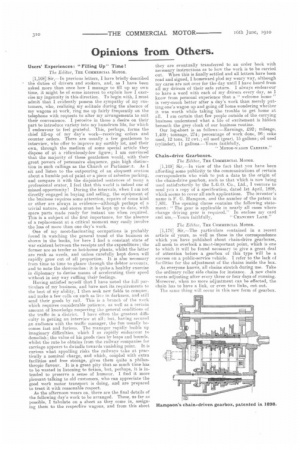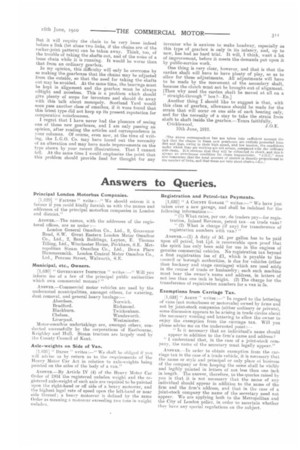Opinions from Others.
Page 16

Page 17

If you've noticed an error in this article please click here to report it so we can fix it.
Users' Experiences: "Filling Up" Time
The Editor, THE COITIEERCIAL MOTOR.
[1,168] Sir,—In previous letters, I have briefly described the duties of drivers and stokers, and, as I have been asked more than once how I manage to fill up my own time, it might be of some interest to explain how I exercise my ingenuity in this direction. To begin with, I must admit that I evidently possess the sympathy of my customers, who, realizing my solitude during the absence of my wagons at work, ring me up fairly frequently on the telephone with requests to alter my arrangements to suit their convenience. I perceive in these a desire on their part to introduce variety into my humdrum life, for which I endeavour to feel grateful. This, perhaps, forms the chief fill-up of my day's work—receiving orders and counter orders. There are usually a few gentlemen to interview, who offer to improve my earthly lot, and their own, through the medium of some special article they dispose of at a ridiculously-low figure; I am convinced that the majority of these gentlemen would, with their great powers of persuasive eloquence, gain high distinction in such callings as the Church or Parliame-1. As I sit and listen to the outpouring of an eloquent oration about a humble pot of paint or a piece of asbestos packing, and compare it with the disjointed sentences of many a professional orator, I feel that this world is indeed one of missed opportunity! During the intervals, when I am not directly engaged in buying and selling, the equipment of the business requires some attention, repairs of some kind or other are always in evidence—although perhaps of a trivial nature, and stores must be kept up to date, with spare parts made ready for instant use when required. This is a subject of the first importance, for the absence of a replacement at a critical moment may easily involve the loss of more than one day's work.
One of my most-fascinating occupations is probably found in watching the general trend of the business as shown in the books, for here I find a constant state of war existent between the receipts and the expenditure; the former are as tender as hot-house plants, whilst the latter are rank as weeds, and unless carefully kept down will rapidly grow out of all proportion. It is also necessary from time to time to glance through the debtor accounts, and to note the slowcoa.ches : it is quite a healthy exercise in diplomacy to devise means of accelerating their speed without in. any way ruffling their feelings.
Having satisfied myself that I have noted the full particulars of my business, and have met its requirements to the best of my ability, I then seek new fields to conquer, and make a few calls on such as tiro in darkness, and still send their goods by rail. This is a branch of the work which requires considerable patienee, as well as a certain amount of knowledge respecting the general conditions of the traffic in a district. I have often the greatest difficulty in getting an interview at all ; but, having secured an audience with the traffic manager, the fun usually becomes fast and furious. The manager rapidly builds up imaginary difficulties, which I as rapidly endeavour to demolish ; the value of his goods rises by leaps and bounds, whilst the rate he obtains from the railway companies for carriage appears to dwindle towards vanishing point. It is curious what appalling risks the railways take at practically a nominal charge, and which, coupled with extra facilities and free storage, gives them quite a philanthropic flavour. It is a. great pity that so much time Las to be wasted in listening to fiction, hut, perhaps, it is intended to preserve a sense of humour. I find it more pleasant talking to old customers, who can appreciate the good work motor transport is doing, and are prepared to treat it with reasonable respect.
As the afternoon wears on. there are the final details of the following day's work to be arranged. These, as far as possible, I tabulate on a sheet as they come in, assigning them to the respective wagons, and from this sheet
they are eventually transferred to an order book with necessary instructions as to how the work is to be carried out. When this is finally settled and all letters have been read and signed, I homeward plod my weary way, although my cares are not over for the day until I have heard from all my drivers of their safe return. I always endeavour to have a word with each of my drivers every day, as know from personal experience that a " welcome home " is very-much better after a day's work than merely putting one's wagon up and going off home wondering whether it was worth while taking the trouble to get home at all. I am certain that few people outside of the carrying business understand what a life of excitement is hidden beneath the grey cloak of our business routine.
Our log-sheet is as follows :—Earnings, £92; mileage, 1,409; tonnage, '274; percentage of work done, 96; coke used, 12 tons, 12 cwt.; oil used (gear), 15 gallons; oil used (cylinder), 11 gallons.—Yours faithfully, MOTOR-WAGON CARRIER."
Chain-drive Gearboxes.
The Editor, THE COMMERCIAL MOTOR.
[1,169] Sir,—In view of the fact that you have been affording some publicity to the communications of certain correspondents who wish to put a date to the origin of the chain-drive gearbox, such as that which is now being used satisfactorily by the L.G.O. Co., Ltd., I venture to send you a copy of a specification, dated 1st April, 1898, which seems to cover all such applications. The inventor's name is F. G. Hampson, and the number of the patent is 7,831. The opening clause contains the following statement: "The gear is applicable in nearly all cases where change driving gear is required." In enclose my card
and am,—Yours faithfully, CHANCERY LANE."
The Editor, THE COMMERCIAL MOTOR.
[1,170] Sir,—The particulars contained in a recent article of yours, as well as those in the correspondence which you have published about chain-drive gearboxes, all seem to overlook a must-important point, which is one to which it will be found necessary to give a great deal of attention before a gearbox of this type will be a success on a public-service vehicle. I refer to the lack of facilities for the adjustment of the chains inside the box.
As everyone knows, all chains stretch during use. Take the ordinary roller side chains for instance. A new chain wants adjusting after every three or four days of running. Moreover, when no more adjustment can be effected, the chain has to have a link, or even two links, cut out.
The same thing will occur in this new form of gearbox. But it will require the chain to be very loose indeed before a link (let alone two links, if the chains are of the rocker-joint pattern) can be taken away. Think, too, of the trouble of taking the shafts out, and of the noise of a loose chain while it is running. It would be worse than that from an ordinary gearbox. In my opinion, this difficulty will only be overcome by so making the gearboxes that the chains may be adjusted from the outside, SO that the need for taking the shafts out may be avoided. At the same time, the bearings must be kept in alignment and the gearbox must be always oiltight and noiseless. This is a problem which should give plenty of scope for inventors and should do away with this talk about monopoly. Scotland Yard would soon pass another class of omnibus, if it were found that this latest type did not keep up its present reputation for comparative noiselessness.
I regret that I have never had the pleasure of seeing one of these new gearboxes, and I am only passing an opinion, after reading the articles and correspondence in your columns. Of course, even now, at the time of writing, the L.G.O. Co. may have found out the necessity of an alteration and may have made improvements on the type shown by your recent illustrations. That I cannot tell. At the same time I would emphasize the point that this problem should provide food for thought for any inventor who is anxious to make headway, especially as this type of gearbox is only in its infancy, and, up to now, has had no hard trial. It will, I think, want a lot of improvement, before it meets the demands put upon it by public-service work.
One thing is very clear, however, and that is that the cardan shaft will have to have plenty of play, so as to allow for these adjustments. All adjustments will have to be made by the movement of the secondary shaft, because the clutch must not be brought out of alignment. ;Then why need the cardan shaft be moved at all on a "
straight-through" box F--En.] Another thing I should like to suggest is that, with this class of gearbox, allowance should be made for the strain that will occur on one side of each bearing only, and for the necessity of a stay to take the strain from shaft to shaft inside the gearbox.—Yours faithfully, Cricklewood, J.O.E. 10th June, 1910.
[The above correspondent has not taken into sufficient account the fact that the chains in these new gearboxes arc entirely protected from dirt and that owing to their high speed, and low tension, the conditions under which they are working are not severe, compared with the ordinary side chain. It is obvious that they will he subjected to shock, and this is always an unwelcome condition for chain transmission. " JOE." must also remember that she total amount of stretch is directly proportional to the number of links, and that these are very short chains.—En. I




















